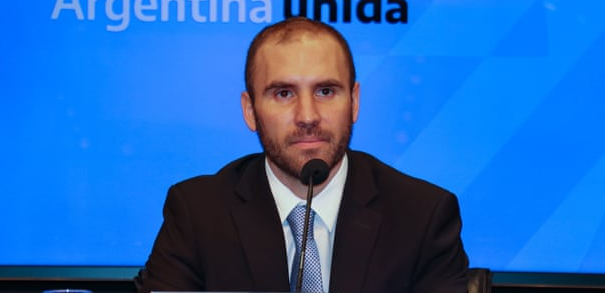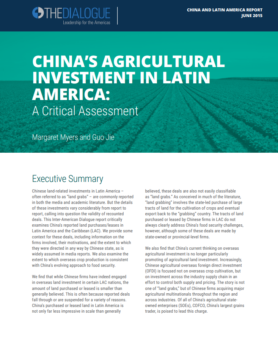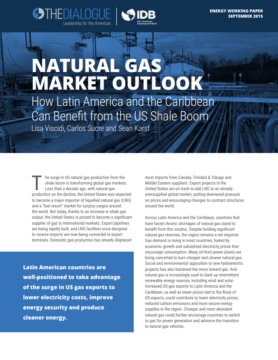The Nationalism of Cristina Fernández de Kirchner
Argentine President Cristina Fernández has increased her appeals to nationalist sentiment to build domestic political support.
A Daily Publication of The Dialogue
Argentina is facing a late March deadline to come to an agreement with the International Monetary Fund as it seeks to restructure $40 billion that it owes the lender. That is when a $2.8 billion payment, for which Argentina appears to lack the international reserves to pay, comes due. In early January, Finance Minister Martín Guzmán told provincial governors that the government still has no deal with the IMF despite 18 months of talks. What are the main obstacles to an agreement between Argentina and the IMF? What effect are internal politics, and a shift in political power following last year’s legislative elections, having on the negotiations? How likely is Argentina to reach a deal with the IMF by March, and what are the consequences if it doesn’t?
Alberto Ramos, managing director and head of Latin America economic research at Goldman Sachs in New York: “Investors have been waiting and hoping for a new IMF program since Argentina’s last debt restructuring operation in August 2020. After 18 months of inconclusive talks the authorities and the IMF appear to still be far apart on a core policy platform that could underpin a new program. The authorities are keen on achieving budget balance only by 2027, while preserving central bank funding of the budget for another five years. This is an extremely gradual, risky and most likely unsustainable proposition. The current model of funding the budget through heavy central bank monetization, rising central bank local currency liabilities and a loss of reserves has very limited longevity. The IMF would like to see faster fiscal consolidation backed up by credible measures and other fiscal and monetary actions to rebalance the economy and ease some of the current micro and macro distortions. Reaching an agreement with the IMF remains an open issue with a difficult and uncertain resolution given the authorities’ reluctance to embrace policy-based macro adjustment. The probability of a failed negotiation, or failed program, is not low. A light IMF program would not induce tangible near-term macro rebalancing and would ultimately fail to improve macro performance. Conversely, a traditional full-fledged IMF program with a robust policy matrix would benefit Argentina, but that may not be acceptable to the authorities or, if accepted, could possibly fail by being off track after the initial review due to weak program-ownership and erratic implementation. In either case, we do not expect the near-term macro picture to improve significantly, even with an IMF program. While a program may not be the harbinger of better polices and macro performance, failing to reach an agreement would still send a negative signal and worsen a complex macro situation. With or without an IMF program, we expect only very mild macro adjustment. The authorities favor only the most gradual steps. This is risky in an economy with already very large real and monetary sector imbalances. The risk of a crash or disorderly adjustment is not low, even with a new IMF program in place.”
Claudio Loser, visiting senior fellow at the Inter-American Dialogue, president of Centennial Group Latin America and former head of the Western Hemisphere Department of the International Monetary Fund: “Time is running out for Argentina in its negotiations with the IMF. After March, if no deal is reached or no payment made, the country would fall into arrears, with eventual serious consequences. The IMF would not be able to continue negotiations, and the country could be effectively suspended, even if informal contact continues. Of equivalent importance, new lending by the World Bank and the Paris Club would be suspended, and countries such as China, and regional lenders may follow suit. Key members of the IMF have indicated that Argentina needs a credible and transparent program, over three years. At present, minister Guzmán is negotiating in public—a very nearsighted idea—blaming the IMF for a lack of flexibility, which is not the case, based on scant existing information. Negotiations are most likely continuing, but the main problem seems domestic. The government fears the backlash of the powerful ‘Cristinista’ wing of the government and thus says there is no need for adjustment. At the same time, the IMF has requested that there be broad support for a program—a frequent failure in the cases of previous Argentine programs. To this end, the government needs the support of the opposition but attacks it because it called the IMF in the first place in 2018. An internal solution is needed but the prospects for it seem slim, until the March date comes closer. Then, reason may prevail, motivated by fear of bankruptcy.”
Kezia McKeague, director at McLarty Associates: “Despite the high stakes for both sides, negotiations between Argentina and the IMF are reportedly stalled over what is at the crux of a new loan program—the speed and scale of a reduction of Argentina’s fiscal deficit. The Argentine government needs to address the perceived lack of a comprehensive economic plan, which has hurt investment prospects throughout the pandemic, as well as address a host of related disequilibria—from expensive public utility subsidies to price and capital controls that have not dampened galloping inflation. While my private conversations with Argentine officials reveal a renewed sense of urgency to conclude the talks, the public stance has demonstrated less interest in reaching a deal that requires serious fiscal adjustment. Instead, the Fernández administration, with support from a recent article by Joseph Stiglitz, has argued that any ‘ajuste’ would hurt the modest growth projected for 2022. Internal politics, both within the governing coalition and the principal opposition bloc, have directly impeded efforts to avoid default. Among Frente de Todos factions, there is little consensus about how much Argentina should cede in the negotiations, as Vice President Fernández de Kirchner maintains her abiding combative stance toward the lending institution. With a strengthened position in Congress following the mid-term elections, Juntos por el Cambio will continue to resist President Fernández’s attempts to share the political costs of an IMF deal, though it will likely support congressional approval in the optimistic scenario of an IMF staff-level agreement by March. Despite the current stalemate, there are strong incentives to avoid the worst-case scenario of default and greater economic turmoil. A failure to reach a deal would trigger an additional default with the Paris Club, and continued exclusion from international debt markets would leave the government increasingly reliant on printing money—and exacerbating inflation—to fund the deficit.”
Alberto Bernal, chief emerging market and global strategist at XP Investments: “Argentina has virtually zero net international reserves, and money demand remains extremely volatile. Argentines have been here before, and they know that the official foreign-exchange rate is artificial. Therefore, they will further shift their pesos to dollars if the Argentine government defaults on the IMF. The main sources of disagreement between the government and the IMF remain the velocity of the needed fiscal adjustment, the central bank’s capacity to implement a contractionary monetary policy stance and implement a disinflationary plan, the lifting of price controls and the structural policies that need to be implemented to boost Argentina’s potential growth. The main obstacle remains the rift between the ‘Kirchnerismo’ and the more pragmatic branch of the Fernández administration. Kirchnerismo wants to stay clear of the political cost implied by Argentina ‘caving’ to the demands of the IMF, and the opposition refuses to vote in favor of the fiscal plan unless Kirchnerismo is on board with the needed legislation. Because of the shift in power that took place in the midterm elections, the administration needs the support of least some members of the opposition. Argentina and the IMF will be able to reach an agreement before the large March amortizations come due. If my view proves inaccurate, a major financial and external accounts crisis will follow, the economy will once again start to contract, unemployment will increase markedly, inflation will accelerate further, and political and social instability will increase. The deepened crisis will then force the Fernández administration and Kirchnerismo to cave to the demands of the opposition and the IMF, and an agreement will then be signed. The problem is that material additional damage will have been delivered to the economy and population at large. Procrastination implies a very material cost, especially for the less well off.”
 The Latin America Advisor features Q&A from leaders in politics, economics, and finance every business day. It is available to members of the Dialogue’s Corporate Program and others by subscription.
The Latin America Advisor features Q&A from leaders in politics, economics, and finance every business day. It is available to members of the Dialogue’s Corporate Program and others by subscription.
Argentine President Cristina Fernández has increased her appeals to nationalist sentiment to build domestic political support.
China is looking for new agricultural investment opportunities in Latin America, but not necessarily for large tracts of land.
Given their close proximity to the United States, LAC countries are well-positioned to capitalize on the surplus of US gas exports and current buyer’s market.
 Even though Argentina and the International Monetary Fund have been discussing a debt restructuring for a year and a half, there is still no agreement, Finance Minister Martín Guzmán said recently. // File Photo: Argentine Government.
Even though Argentina and the International Monetary Fund have been discussing a debt restructuring for a year and a half, there is still no agreement, Finance Minister Martín Guzmán said recently. // File Photo: Argentine Government.

